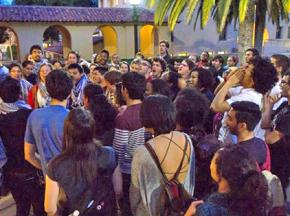A step toward divestment at Stanford
The campaign to pressure the student Senate to pass a resolution supporting divestment from apartheid enjoyed broad support on campus, reports .
THE STUDENT government at Stanford University passed a resolution in support of divestment from companies enabling human rights abuses against Palestinians.
At the February 17 meeting of the Undergraduate Senate of the Associated Students of Stanford University (ASSU), 10 senators voted in favor and four against, with one abstention--a resounding two-thirds majority, demonstrating growing and confident support for justice for Palestine.
Stanford's undergraduate Senate became the first to pass such a resolution among private, high-profile universities in the U.S.--the student body at Northwestern University joined in just two days later. In another major victory, the University of California (UC) Student Association, which represents 230,000 students in the UC system, endorsed divestment in support of Palestinian rights.
The resolution was the work of Stanford Out of Occupied Palestine (SOOP), a coalition of 19 student groups and many individual activists. The coalition organized an impressive campaign in the first six weeks of the quarter, gathering more than 1,600 student signatures on a petition supporting divestment from occupied Palestine; knocking on several hundred doors in student residences; and putting on weekly educational events. More than 30 faculty members signed a letter of support.

A week prior to the successful vote, the student Senate held a public hearing about the resolution. Palestinian students spoke movingly about the harm inflicted on them and their families by practices that Stanford University condones with its investments.
One student shared that he was with his cousin in the West Bank in her final days as she passed away from cancer, unable to get the treatment she needed because the Israeli occupation denied her entry into Jerusalem, and unable to even get morphine that would have eased her suffering.
Another student related the pain she and her family have experienced in the aftermath of her brother becoming paralyzed after the Israeli military fired live ammunition at a nonviolent demonstration near the border with Lebanon. These testimonies are essential--they are reminders that while the fight for Palestinian liberation is inherently political, it is rooted in the real lives, real suffering and real aspirations of human beings.
THIS WAS a campaign unlike any other in recent history at Stanford. One of the reasons that so many students regularly contributed their time and energy to it is that there was widespread support among the student body. I experienced the ease with which we could get a couple dozen signatures in an hour in the dining areas, with many signers thanking us for doing this work.
The success of this divestment campaign demonstrates that the tide has turned on American campuses when it comes to Palestine solidarity. At Electronic Intifada, Nora Barrows-Friedman has written about the "divestment wave" hitting UC Davis, Stanford, San Diego State University, DePaul University and Ohio State University (after rolling through UCLA last winter).
The Israeli government cannot continue building settlements, attacking Gaza and denying the fundamental dignity and humanity of Palestinians without facing a growing, organized opposition. While opponents of divestment make claims about "divisiveness," the reality is that there is a broad and growing unity among students and student organizations calling for action against these injustices.
There is still much work to be done at Stanford. Students are making the case for divestment to the Advisory Panel on Investment Responsibility and Licensing (APIRL), which advises the Stanford Board of Trustees about socially responsible investing. While the support of the undergraduate student Senate is a big step, there are good reasons to believe that every additional step towards divestment will be more challenging than the prior one.
As was made evident by the University of Illinois' firing of Steven Salaita, tremendous pressures exist both within and upon university administrations to act against criticisms of Israeli policy and expressions of solidarity with Palestine. That said, it is also evident that more and more people are realizing that the status quo is unjust and that divestment can be a tool for change. Student organizers can bring that reality to light for the APIRL.
Finally, there is more education to be done on campus about the boycott, divestment and sanctions (BDS) movement. Over and over, opponents of divestment raised the specter of BDS as a scare tactic. Many supporters of divestment don't know enough about BDS and are confused or concerned about allegations that BDS supports the destruction of Israel or is somehow anti-Semitic.
The success of the divestment resolution will make it easier for proponents of BDS at Stanford, like Students for Justice in Palestine, to clarify what the movement stands for and why it's worth supporting.


